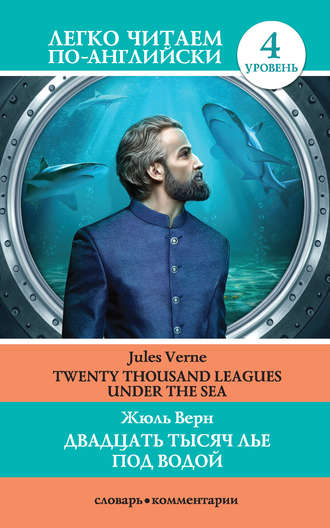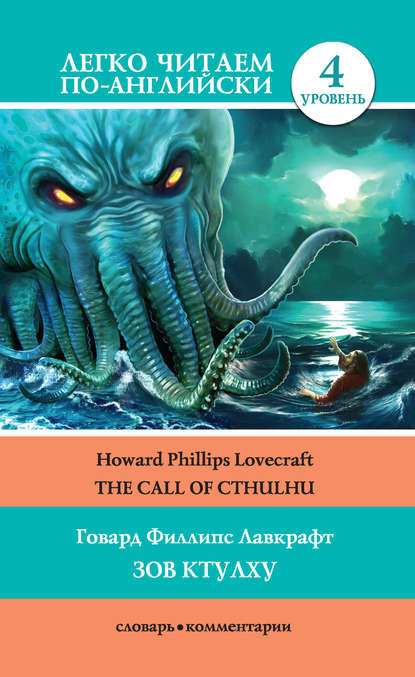
Полная версия
Двадцать тысяч лье под водой / Twenty Thousand Leagues Under the Sea
The door opened. A steward entered. He brought us some clothes, jackets and sailor’s pants, made out of a fabric whose nature I didn’t recognize. We hurried to change into them.
Meanwhile our silent steward, perhaps a deaf-mute, set the table and laid three place settings.
Overlaid with silver dish covers, various platters had been neatly positioned on the table cloth, and we sat down to eat. Assuredly, we were dealing with civilized people. The water was fresh and clear. Among the foods we were served, I was able to identify various fish. As for the tableware, it was elegant and in perfect taste. Each utensil, spoon, fork, knife, and plate, bore on its reverse a letter encircled by a Latin motto:
Mobilis in mobili[23]
N
Moving within the moving element! It was a highly appropriate motto for this underwater machine. The letter N was no doubt the initial of the name of that mystifying individual in command beneath the seas!
Our appetites appeased, we felt an urgent need for sleep. A natural reaction after that interminable night of fighting for our lives.
My two companions lay down on the cabin’s carpeting and were soon deep in slumber.
As for me, too many thoughts had piled up in my mind, too many insoluble questions had arisen, too many images were keeping my eyelids open! Where were we? What strange power was carrying us along? Then my mind grew calmer, my imagination melted into hazy drowsiness, and I soon fell into an uneasy slumber.
Chapter 9
I had gotten up from my passably hard mattress when I felt my mind clear. So I began a careful reexamination of our cell.
Nothing had changed in its interior arrangements. The prison was still a prison and its prisoners still prisoners. But the steward had cleared the table. Consequently, nothing indicated any forthcoming improvement in our situation, and I seriously wondered if we were doomed to spend the rest of our lives in this cage.
It was becoming hard for me to breathe. The heavy air was no longer sufficient for my lungs. Although our cell was large, we obviously had used up most of the oxygen it contained.
So it was now urgent to renew the air in our prison, and no doubt the air in this whole underwater boat as well.
How did the commander of this aquatic residence get fresh air? Did he obtain air using chemical methods, releasing the oxygen contained in potassium chlorate by heating it? If so, he would have to keep up some kind of relationship with the shore.
Suddenly I was refreshed by a current of clean air, scented with a salty aroma. It had to be a sea breeze, life-giving and charged with iodine! I opened my mouth wide. This boat, this sheet-iron monster, had obviously just risen to the surface of the ocean. So the ship’s mode of ventilation was finally established.
Ned and Conseil woke up almost simultaneously, under the influence of this reviving air purification. They rubbed their eyes, stretched their arms, and sprang to their feet.
“Did master sleep well?” Conseil asked me.
“Extremely well, my gallant lad,” I replied. “And how about you, Mr. Ned Land?”
“Like a log, professor. But it seems like I’m breathing a sea breeze!”
A seaman couldn’t be wrong on this topic, and I told the Canadian what had gone on while he slept.
“Good!” he said. “That explains perfectly everything. But I’ve no idea what time it is, Professor Aronnax, maybe it’s dinnertime?”
“Dinnertime, my fine harpooner? I’d say at least breakfast time, because we’ve certainly woken up to a new day.”
“Which indicates,” Conseil replied, “that we’ve spent twenty-four hours in slumber.”
“That’s my assessment,” I replied.
“I won’t argue with you,” Ned Land answered. “But dinner or breakfast, that steward will be plenty welcome whether he brings the one or the other.”
“The one and the other,” Conseil said.
“Well,” the Canadian replied. “We deserve two meals.”
“All right, Ned, let’s wait and see!” I replied. “It’s clear that these strangers don’t intend to let us die of hunger.”
“Unless they’re fattening us up!” Ned shot back.
“I object,” I replied. “We have not fallen into the hands of cannibals.”
“Who knows?” the Canadian replied in all seriousness. “Maybe these people have gone without fresh meat for a long while, and in that case three healthy, well-built specimens like the professor, his servant, and me—”
“Get rid of those ideas, Mr. Land,” I answered the harpooner.
“Anyhow,” the harpooner said, “I’m hungry!”
“Mr. Land,” I answered, “we have to adapt to the schedule on board, and I imagine our stomachs are running ahead of the chief cook’s dinner bell.”
“Well then, we’ll adjust our stomachs to the chef’s timetable!” Conseil replied serenely.
“Conseil my friend!” the impatient Canadian shot back. “You’re so calm! You’d starve to death rather than complain!”
“Let’s wait,” I said. “Let’s be guided by events, and let’s do nothing, since right now there’s nothing we can do.”
“On the contrary, professor,” the harpooner replied. “There is something we can do.”
“Oh? And what, Mr. Land?”
“Break out of here![24]”
“Breaking out of a prison on shore is difficult enough, but with an underwater prison, it is completely impossible.”
The harpooner said nothing. Under the conditions in which fate had left us, it was absolutely impossible to escape.
“So, Professor Aronnax,” Ned Land went on after thinking for a few moments, “you haven’t figured out what people do when they can’t escape from their prison?”
“No, my friend.”
“Easy. They kick out all the jailers, guards, and wardens,” Ned Land added.
“What’s this, Ned?” I asked. “You’d seriously consider it?”
“Very seriously,” the Canadian replied.
“It’s impossible.”
“And why is that, sir? Some promising opportunity might come up, and I don’t see what could stop us from taking advantage of it!”
Then our conversation finished, and each of us withdrew into his own thoughts. For my part, I had no faith in those promising opportunities that Ned Land mentioned. Besides, before we could do anything, we had to be free, and that we definitely were not.
Ned Land’s hunger was getting him madder and madder. He stood up, pacing in circles like a wild beast in a cage, striking the walls with his foot and fist. Meanwhile the hours passed, our hunger nagged unmercifully, and this time the steward did not appear.
For two more hours Ned Land’s rage increased. The Canadian shouted and pleaded, but the sheet-iron walls were deaf. I didn’t hear a single sound inside this boat. The vessel had undoubtedly sunk into the watery deep and no longer belonged to the outside world.
A noise was audible outside. The locks were turned, the door opened, and the steward appeared.
Before I could make a single movement to prevent him, the Canadian rushed at the poor man, threw him down, held him by the throat.
Conseil was already trying to loosen the harpooner’s hands from his half-suffocated victim, and I had gone to join him, when I heard these words pronounced in French:
“Calm down, Mr. Land! And you, professor, kindly listen to me!”
Chapter 10
It was the ship’s commander who had just spoken. At these words Ned Land stood up quickly. In silence we waited for the outcome of this scene; Conseil seemed almost fascinated, I was stunned.
Arms crossed, leaning against a corner of the table, the commander studied us with great care. Did he regret those words he had just pronounced in French? You would have thought so.
“Gentlemen,” he said in a calm, penetrating voice, “I speak French, English, German, and Latin with equal fluency. Hence I could have answered you as early as our initial interview, but first I wanted to make your acquaintance. Your four versions of the same narrative established your personal identities for me. Now I know you: Professor Pierre Aronnax, specialist in natural history at the Paris Museum and entrusted with a scientific mission abroad, his servant Conseil, and Ned Land, a harpooner of Canadian origin aboard the Abraham Lincoln, a frigate in the national navy of the United States of America.”
I bowed in agreement. The commander hadn’t put a question to me. This man expressed himself with perfect ease and without a trace of an accent. His words were well chosen.
He went on:
“I had great difficulty deciding to talk to you. I am the man who has cut himself off from humanity. Your coming has disrupted my whole existence.”
“Unintentionally,” I said.
“Unintentionally?” the stranger replied, raising his voice a little. “Was it unintentionally that the Abraham Lincoln hunted me on every sea? Was it unintentionally that you traveled aboard that frigate? Was it unintentionally that Mr. Ned Land hit me with his harpoon?”
I detected a controlled irritation in these words.
“Sir,” I said, “you’re surely unaware of the discussions that have taken place in Europe and America with yourself as the subject. You don’t realize that various accidents, caused by collisions with your underwater machine, have aroused public passions on those two continents. We’ve tried to explain this inexplicable phenomenon, whose secret is yours alone. But please understand that the Abraham Lincoln chased you over the Pacific high seas in the belief it was hunting some powerful marine monster.”
A half smile curled the commander’s lips. He said, in a calmer tone:
“Professor Aronnax,” he replied, “do you believe that your frigate wouldn’t have chased and cannonaded an underwater boat as readily as a monster?”
This question baffled me, since Commander Farragut would certainly have shown no such hesitation.
“So you understand, sir,” the stranger went on, “that I have a right to treat you as my enemy.”
I kept quiet.
“Nothing obliged me to grant you hospitality,” the commander went on. “I could sink under the sea, and I could forget you ever existed. Wouldn’t that be my right?”
“Perhaps it would be the right of a savage,” I replied. “But not that of a civilized man.”
“Professor,” the commander replied swiftly, “I’m not what you term a civilized man! I’ve severed all ties with society. Therefore I obey none of its regulations.”
This man had rendered himself independent, out of all reach, free in the strictest sense of the word! No man could call him to account for his actions. These thoughts swiftly crossed my mind.
After a long silence, the commander went on with our conversation.
“But since fate has brought you here,” he said. “you’ll stay aboard my vessel. You’ll be free here, and in exchange for that freedom, I’ll lay on you just one condition. Your word that you’ll submit to it will be sufficient.”
“Go on, sir,” I replied. “I assume this condition is one an honest man can accept?”
“Yes, sir. Just this. It’s possible that certain unforeseen events may force me to confine you to your cabins for some hours, or even for some days. Since I prefer never to use violence, I expect from you in such a case your unquestioning obedience. Do you accept this condition?”
“We accept,” I replied. “Only, I’ll ask your permission, sir, to address a question to you, just one.”
“Go ahead, sir.”
“You said we’d be free aboard your vessel?”
“Completely.”
“Then I would ask what you mean by this freedom.”
“Why, the freedom to come, go, see, and even closely observe everything happening here—in short, the freedom we ourselves enjoy, my companions and I.”
It was obvious that we did not understand each other.
“Pardon me, sir,” I went on, “but that’s merely the freedom that every prisoner has, the freedom to pace his cell! That’s not enough for us.”
“Nevertheless, it will have to do!”
“What! We must give up seeing our homeland, friends, and relatives ever again?”
“Yes, sir. But giving up that intolerable earthly yoke that some men call freedom is perhaps less painful than you think!”
“By thunder!” Ned Land shouted. “I’ll never promise I won’t try getting out of here!”
“I didn’t ask for such a promise, Mr. Land,” the commander replied coldly.
“Sir,” I replied, “you’re taking unfair advantage of us! This is cruelty!”
“No, sir, it’s an act of mercy! You’re my prisoners of war! I’ve cared for you when I could plunge you back into the ocean depths! You attacked me! You’ve known the secret no living man must know, the secret of my entire existence! Do you think I’ll send you back to a world that must know nothing more of me? Never!”
“Then, sir,” I went on, “you give us, quite simply, a choice between life and death?”
“Quite simply.”
“My friends,” I said, “we have nothing to do. But no solemn promises bind us to the commander of this vessel.”
“None, sir,” the stranger replied.
Then, in a gentler voice, he went on:
“Now, allow me to finish what I have to tell you. I’ve heard of you, Professor Aronnax. Among my books you’ll find the work you’ve published on the great ocean depths. But you don’t know everything because you haven’t seen everything. Let me tell you, professor, you won’t regret the time you spend aboard my vessel. You’re going to voyage through a land of wonders. I’m going to make another underwater tour of the world—perhaps my last, who knows?—and I’ll review everything I’ve studied in the depths of these seas that I’ve crossed so often, and you can be my fellow student.”
I can’t deny it; the commander’s words had a tremendous effect on me. He had caught me on my weak side, and I momentarily forgot that this experience was worth the loss of my freedom. So I replied:
“Sir, even though you’ve cut yourself off from humanity, I can see that you haven’t disowned all human feeling. We’re castaways, you’ve saved us, we’ll never forget that. I have but one last question.”
“Ask it, professor.”
“By what name am I to call you?”
“Sir,” the commander replied, “to you, I’m simply Captain Nemo; to me, you and your companions are simply passengers on the Nautilus.”
Captain Nemo went out. A steward appeared. The captain gave him his orders in that strange language I couldn’t even identify. Then, turning to the Canadian and Conseil:
“A meal is waiting for you in your cabin,” he told them. “Kindly follow this man.”
“That’s an offer I can’t refuse!” the harpooner replied.
“And now, Professor Aronnax, our own breakfast is ready. Allow me to lead the way.”
“Yours to command, captain.”
I went down a kind of electrically lit passageway that resembled a gangway on a ship. After a stretch of some ten meters, a second door opened before me.
I then entered a dining room, decorated and furnished in austere good taste. Tall oaken sideboards stood at both ends of this room, and sparkling on their shelves were rows of earthenware, porcelain, and glass of incalculable value. In the center of this room stood a table, richly spread. Captain Nemo indicated the place I was to occupy.
“Be seated,” he told me, “and eat, please.”
Our breakfast consisted of several dishes whose contents were all supplied by the sea, and some foods whose nature was unknown to me. These various food items seemed to be rich in phosphorous.
Captain Nemo stared at me. I had asked him nothing, but he read my thoughts, and on his own he answered the questions I was itching to address him.
“Most of these dishes are new to you,” he told me. “But you can consume them without fear. They’re healthy and nourishing. I renounced terrestrial foods long ago. My crew are strong and full of energy, and they eat what I eat.”
“So,” I said, “all these foods are products of the sea?”
“Yes, professor, the sea supplies all my needs. Sometimes I cast my nets, sometimes I go hunting far out of man’s reach, and I corner the game that dwells in my underwater forests. My herds graze without fear on the ocean’s immense prairies.”
I stared at Captain Nemo in definite astonishment, and I answered him:
“Sir, I understand perfectly how your nets can furnish excellent fish for your table; I understand less how you can chase aquatic game in your underwater forests; but how a piece of red meat, no matter how small, can figure in your menu, that I don’t understand at all.”
“Nor I, sir,” Captain Nemo answered me. “I never touch the flesh of land animals.”
“Nevertheless, this … ,” I went on, pointing to a dish where some slices of loin were still left.
“What you believe to be red meat, professor, is nothing other than loin of sea turtle. Similarly, here are some dolphin livers you might mistake for stewed pork. My chef is a skillful food processor. Feel free to try all of these foods. Here are some preserves of sea cucumber, here’s cream from milk furnished by the udders of cetaceans, and sugar from the huge fucus plants in the North Sea; and finally, allow me to offer you some marmalade of sea anemone, equal to that from the tastiest fruits. The sea, Professor Aronnax, not only feeds me, it dresses me as well. That fabric covering you was woven from the masses of filaments that anchor certain seashells. The perfumes you’ll find on the washstand in your cabin were produced from the oozings of marine plants. Your mattress was made from the ocean’s softest eelgrass. Your pen will be whalebone, your ink a juice secreted by cuttlefish or squid. Everything comes to me from the sea, just as someday everything will return to it!”
“You love the sea, captain.”
“Yes, I love it! The sea is everything! It covers seven-tenths of the planet earth. Its breath is clean and healthy. It’s an immense wilderness where a man is never lonely. It’s simply movement and love; it’s living infinity. The sea is a vast pool of nature. Our globe began with the sea, so to speak, and who can say we won’t end with it! Here lies supreme tranquility. The sea doesn’t belong to tyrants. On its surface they can battle each other, devour each other. But thirty feet below sea level, their dominion ceases, their influence fades, their power vanishes! Live in the heart of the seas! Here alone lies independence! Here I’m free!”
Captain Nemo suddenly fell silent in the midst of this enthusiastic speech. Had he said too much? Then he turned to me:
“Now, professor,” he said, “if you’d like to inspect the Nautilus, I’m yours to command.”
Chapter 11
Captain Nemo stood up. I followed him. Contrived at the rear of the dining room, a double door opened, and I entered a room.
It was a library. Tall, black-rosewood bookcases held a large number of books. Light, movable reading stands, which could be pushed away or pulled near as desired, allowed books to be positioned on them for easy study. In the center stood a huge table covered with pamphlets, among which some newspapers. Electric light was falling from four globes set in the ceiling. I couldn’t believe my eyes.
“Captain Nemo,” I told my host, “this is a library that would do credit to more than one continental palace, and I truly marvel to think it can go with you into the deepest seas.”
“Where could one find greater silence or solitude, professor?” Captain Nemo replied. “Did your study at the museum afford you such a perfect retreat?”
“No, sir, and I might add that you own 6,000 or 7,000 volumes here.”
“12,000, Professor Aronnax. They’re my sole remaining ties with dry land. I left the shore the day my Nautilus submerged for the first time under the waters. That day I purchased my last volumes, my last pamphlets, my last newspapers. Professor, these books are at your disposal, and you may use them freely.”
I thanked Captain Nemo and approached the shelves of this library. Written in every language, books on science, ethics, and literature were there in abundance, but I didn’t see a single work on economics. One odd detail: all these books were shelved indiscriminately without regard to the language in which they were written, and this jumble proved that the Nautilus’s captain could read fluently many languages.
Among these books I noted masterpieces by the greats of ancient and modern times. Books on history, poetry, fiction, and science, mechanics, ballistics, hydrography, meteorology, geography, geology, natural history, astronomy!
“Sir,” I told the captain, “thank you for placing this library at my disposal. There are scientific treasures here, and I’ll take advantage of them.”
“This room isn’t only a library,” Captain Nemo said, “it’s also a smoking room.”
“A smoking room?” I exclaimed. “Then one may smoke on board?”
“Surely.”
“In that case, sir, I’m forced to believe that you’ve kept up relations with Havana.”
“None whatever,” the captain replied. “Try this cigar, Professor Aronnax, and even though it doesn’t come from Havana, it will satisfy you.”
I took the cigar that was offered me, whose shape recalled those from Cuba; but it seemed to be made of gold leaf. I lit it.
“It’s excellent,” I said, “but it’s not from the tobacco plant.”
“Right,” the captain replied, “this tobacco comes from neither Havana nor the Orient. It’s a kind of nicotine-rich seaweed that the ocean supplies me. Smoke these cigars whenever you like, without debating their origin.”
Then Captain Nemo opened a door, and I passed into an immense, splendidly lit lounge.
It was a huge quadrilateral with canted corners, ten meters long, six wide, five high. A luminous ceiling, decorated with delicate arabesques, distributed a soft, clear daylight over all the wonders gathered in this museum. For a museum it truly was!
Thirty pictures by the masters, tapestries of austere design. There I saw canvases of the highest value. Wonderful miniature statues in marble or bronze, modeled after antiquity’s finest originals, stood on their pedestals in the corners of this magnificent museum.
“Sir,” I replied, “might I venture to identify you as an artist?”
“A collector, sir, nothing more. Formerly I loved acquiring these beautiful works created by the hand of man, and I’ve been able to gather some objects of great value. They’re my last mementos of those shores that are now dead for me. In my eyes, your modern artists are already as old as the ancients. They’ve existed for 2,000 or 3,000 years, and I mix them up in my mind. The masters are ageless.”
Captain Nemo fell silent and seemed lost in reverie. I regarded him with intense excitement. Leaning his elbow on the corner of a valuable mosaic table, he no longer saw me, he had forgotten my very presence.
I didn’t disturb his meditations but continued to pass in review the curiosities that enriched this lounge.
After the works of art, natural rarities predominated. They consisted chiefly of plants, shells, and other exhibits from the ocean.
“You’re examining my shells, professor? For me they have an added charm, since I’ve collected every one of them with my own two hands, and not a sea on the globe has escaped my investigations.”
“I understand, captain. You’re a man who gathers his treasure in person. No museum in Europe owns such a collection of exhibits from the ocean. May I learn—”
“Professor Aronnax,” Captain Nemo answered me, “I’ve said you’d be free aboard my vessel. You may inspect the Nautilus in detail, and I’ll be delighted to act as your guide. But beforehand, come inspect the cabin set aside for you.”
I followed Captain Nemo led me back down the ship’s gangways. He took me to the bow, and there I found not just a cabin but an elegant stateroom with a bed, a washstand, and various other furnishings.
I could only thank my host.
“Your stateroom adjoins mine,” he told me, opening a door, “and mine leads into that lounge we’ve just left.”
I entered the captain’s stateroom. It had an austere, almost monastic appearance. An iron bedstead, a worktable, some washstand fixtures. Subdued lighting. No luxuries. Just the bare necessities.
Captain Nemo showed me to a bench.
“Kindly be seated,” he told me.
I sat, and he began speaking,
Chapter 12
“Sir,” Captain Nemo said, showing me the instruments hanging on the walls of his stateroom, “these are the devices needed to navigate the Nautilus. Here, as in the lounge, I always have them before my eyes, and they indicate my position and exact heading in the middle of the ocean. You’re familiar with some of them, such as the thermometer, which gives the temperature inside the Nautilus; the barometer, which measures the heaviness of the outside air and forecasts changes in the weather; the humidistat, which indicates the degree of dryness in the atmosphere; the storm glass, which foretells the arrival of tempests; the compass, which steers my course; the sextant, which takes the sun’s altitude and tells me my latitude; chronometers, which allow me to calculate my longitude; and finally, spyglasses for both day and night, enabling me to scrutinize every point of the horizon once the Nautilus has risen to the surface of the waves.”













